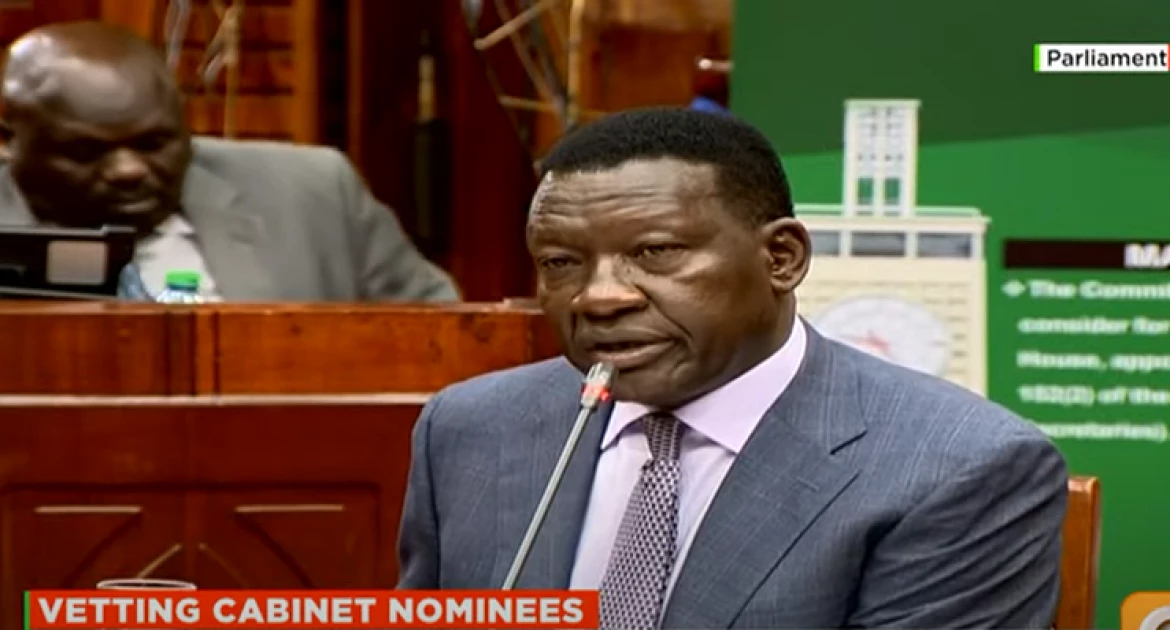Ghosts of Ksh.50M 'Chicken gate' scandal return to haunt Davis Chirchir at CS vetting

Energy and Petroleum CS nominee Davis Chirchir in Parliament during his vetting on October 18, 2022.

Audio By Vocalize
Energy and Petroleum Cabinet Secretary nominee
Davis Chirchir has denied playing any part in the infamous ‘Chicken gate’
scandal that rocked the now defunct Interim Independent Electoral Commission (IIEC)
12 years ago.
The scandal revealed pay outs amounting to
millions of shilling by U.K firm Smith and Ouzman to Kenyan election officials ostensibly
for the award of lucrative ballot paper printing contracts.
Chirchir, who was the then Energy CS, resigned
after he was listed among 175 people in the scandal, alongside other notable names such as: former IIEC Chief Executive Officer James Oswago,
Uasin Gishu Woman Representative Gladys Boss who was the then deputy CEO,
lawyer Kennedy Nyaundi, then a commissioner, Kenneth Karani, who was a senior
procurement officer and former KNEC Boss Paul Wasanga.
However, while appearing before
the National Assembly’s Committee on Appointments for vetting after his
nomination back to the very same Energy CS position on Tuesday, Chirchir denied any involvement
in the scandal saying he had been cleared.
Chirchir absolved himself
from the matter saying investigations were conducted and those found to have allegedly
participated in the scam were arraigned in court.
He said he resigned from government after his
name was mentioned purely to allow for probe to be conducted in line with the
Constitution, intimating that that in no way showed his guilt.
“In the President’s State of the Nation
address of Thursday, March 26, 2015, my name was among 175 that were tabled in
Parliament on allegations that I was not aware of. I wrote to the President, as
he had basically requested those who had been mentioned, to step aside to allow
investigations to take part in line with Chapter 6 and the other clauses
requiring integrity of the office such as the one I held,” he told the MPs.
“The investigations were completed and I
managed to get documentation to prove that those who were found culpable were
charged and I was not one of them. I went to my lawyer and asked them to
confirm whether the file had been closed, because investigations – in my own
understanding – had been finished, and those who were found culpable had been
taken to court and charged.”
He added: “I have a letter done to the Clerk
of the National Assembly which is, basically, absolving me of any liability in
terms of those who were found culpable, and I expect that the Clerk should’ve
put that in the file to close this matter once and for all.”
The ‘Chicken gate' scandal occurred over
the course of two years (October 1, 2008 - December 2010), during which senior
managers and commissioners at IIEC were beneficiaries of kickbacks from Smith and Ouzman, a UK- based company specialising in printing security documents.
The bribes amounted to about Ksh.50
million. This was done by inflating most of the printing contracts by up to 38
per cent.
The underhand cash deals even had a
code name in the emails exchanged between the printer and election officials.
‘Chicken’ was the word that would
facilitate Smith and Ouzman winning seven tenders to supply election
materials such as ballot papers, voter registration forms, voter ID cards and
nomination forms.
All these revelations came out in a
four-year-long forensic investigation carried out by the UK’s Serious Fraud
Office, that investigates and prosecutes serious and complex fraud cases,
including bribery and corruption.
A 2014 case prosecuting senior managers
at Smith and Ouzman revealed that the printer provided election materials for
the 2010 Constitution referendum, four parliamentary by-elections held in
Shinyalu, Bomachoge, South Mugirango and Matuga as well as a host of civic
polls.
The senior managers at Smith and Ouzman
implicated in the case included Christopher Smith (the former chairman), his
son Nicholas Smith who handled sales and marketing, Tim Forrester who served as
the international sales manager, and Trevy James Oyombra, the Kenyan agent.
The funds were mostly transferred to Mr
Oyombra’s accounts held at KCB and then distributed to beneficiaries.
This evidence was enough to see
Nicholas Smith serve three years in jail while his father Christopher, got a
one-and-a-half year suspended term with a 250-hour community service.


Leave a Comment